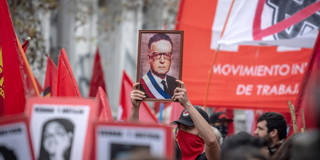Fifty years after Augusto Pinochet’s coup destroyed Chile’s democracy, current President Gabriel Boric confronts the same challenge faced by Salvador Allende: how to transform society through democratic means. Boric must forge strong alliances, and fast, because the far right, led by José Antonio Kast, is gaining ground.
MEXICO CITY – Commemorating a coup d’état can be difficult, especially in Latin America, where coups, and the military caudillos that often follow, have been commonplace. The September 11, 1973, putsch that overthrew the democratically elected Chilean President Salvador Allende could be considered one of many. But this tragedy has some unique characteristics, captured in the stream of books, documentaries, and commentaries – some with new revelations – marking the coup’s 50th anniversary and assessing Allende’s presidency, which ended in his untimely death.
Allende promised democratic socialism: a peaceful revolution flavored “with empanadas and red wine,” as he put it, underscoring the unique national character of his political project. A socialist system achieved through free elections, rather than being imposed on society by force, represented a historical novelty, and people as far away as Italy and France watched with great interest. To this day, many Chileans remember Allende’s government for its sincere efforts to empower the disenfranchised.
The brutality with which General Augusto Pinochet eviscerated this experiment is also singular. Despite the proliferation of coups in Latin America, never before had a presidential palace been bombed, nor a president’s body pulled from the wreckage. Moreover, it was an institutional coup, not a typical military putsch motivated more by personal ambition than ideology; the entire armed forces and the police supported Pinochet’s regime.

MEXICO CITY – Commemorating a coup d’état can be difficult, especially in Latin America, where coups, and the military caudillos that often follow, have been commonplace. The September 11, 1973, putsch that overthrew the democratically elected Chilean President Salvador Allende could be considered one of many. But this tragedy has some unique characteristics, captured in the stream of books, documentaries, and commentaries – some with new revelations – marking the coup’s 50th anniversary and assessing Allende’s presidency, which ended in his untimely death.
Allende promised democratic socialism: a peaceful revolution flavored “with empanadas and red wine,” as he put it, underscoring the unique national character of his political project. A socialist system achieved through free elections, rather than being imposed on society by force, represented a historical novelty, and people as far away as Italy and France watched with great interest. To this day, many Chileans remember Allende’s government for its sincere efforts to empower the disenfranchised.
The brutality with which General Augusto Pinochet eviscerated this experiment is also singular. Despite the proliferation of coups in Latin America, never before had a presidential palace been bombed, nor a president’s body pulled from the wreckage. Moreover, it was an institutional coup, not a typical military putsch motivated more by personal ambition than ideology; the entire armed forces and the police supported Pinochet’s regime.